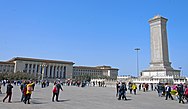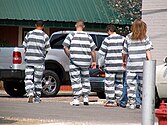
Back Mag (sosiale wetenskappe) Afrikaans نفوذ Arabic Улада Byelorussian Улада BE-X-OLD Власт (обществено отношение) Bulgarian Moć (socijalna i politička) BS Poder (sociologia) Catalan Guòng-lĭk CDO ھێز (فەلسەفە) CKB Moc Czech
| Part of a series on |
| Sociology |
|---|
 |
In political science, power is the social production of an effect that determines the capacities, actions, beliefs, or conduct of actors.[1] Power does not exclusively refer to the threat or use of force (coercion) by one actor against another, but may also be exerted through diffuse means (such as institutions).[1][2]
Power may also take structural forms, as it orders actors in relation to one another (such as distinguishing between a master and an enslaved person, a householder and their relatives, an employer and their employees, a parent and a child, a political representative and their voters, etc.), and discursive forms, as categories and language may lend legitimacy to some behaviors and groups over others.[1]
The term authority is often used for power that is perceived as legitimate or socially approved by the social structure. Power can be seen as evil or unjust; however, power can also be seen as good and as something inherited or given for exercising humanistic objectives that will help, move, and empower others as well.
Scholars[citation needed] have distinguished the differences between soft power and hard power.
- ^ a b c Barnett, Michael; Duvall, Raymond (2005). "Power in International Politics". International Organization. 59 (1): 39–75. doi:10.1017/S0020818305050010. ISSN 0020-8183. JSTOR 3877878. S2CID 3613655.
- ^ Finnemore, Martha; Goldstein, Judith (2013), "Puzzles about Power", Back to Basics: State Power in a Contemporary World, Oxford University Press, doi:10.1093/acprof:oso/9780199970087.003.0001, ISBN 978-0-19-997008-7, retrieved 9 April 2022



